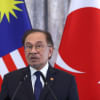15 lakh to get job in 3 years
The cabinet yesterday approved a draft deal to allow Bangladeshi private recruiting agents to send workers to Malaysia following the failure of the government-to-government (G2G) labour recruitment system.
Through the new “G2G Plus” system, a worker can get a job in the Southeast Asian nation, and the migration cost would be a maximum of Tk 37,000, Cabinet Secretary M Shafiul Alam told reporters after a meeting at the Secretariat.
The government hopes to send around 15 lakh workers to Malaysia in the next three years under a Memorandum of Understanding (MoU) to be signed with Malaysia in a month, he said.
The G2G Plus also has a provision for recruitment of Bangladeshi female workers in Malaysia, said the cabinet secretary.
Under the deal, Malaysia will recognise Bangladesh as a “source country” from where workers can be recruited in services, manufacturing, construction and plantation sectors there, said Shafiul.
Once the new deal is signed, the previous labour agreements of 2012 and the protocol of 2014 would cease to exist, he said.
Malaysian employers would pay for workers' security deposits, levies, visa fees, and health and compensation insurance.
Bangladesh and Malaysia are going for the new deal after the failure of the G2G. Only 10,000 Bangladeshi workers have so far been sent to Malaysia under the G2G since it was launched in 2012.
Industry insiders said powerful lobbies with vested interests had a part in the failure of the G2G, which led Malaysia to take an initiative in June last year for recruitment of workers through private sector.
Both the countries went for the G2G, as Bangladesh's labour relations with Malaysia had been stained with corruption, joblessness, low wage, non-payment and bad living conditions when private recruiting agents were involved in the business in 2007-08.
Involvement of too many middlemen and charging each worker around Tk 2 lakh for recruitment in Malaysia were cited as major reasons behind the problems then, which led to a ban on recruitments from Bangladesh in early 2009.
The recent government move to send workers to Malaysia through the private sector caused controversies with several Malaysian companies allegedly lobbying the two governments to win contracts for management and monitoring of recruitment.
The names of Bestinet, Real Time Networking and Synerflux came up prominently.
Following rights groups' criticism against Bestinet and Real Time Networking, Synerflux was reportedly short-listed by Malaysia.
Bangladesh Association of International Recruiting Agencies (Baira) raised strong objections against Synerflux, saying it would create monopoly.
On December 6 last year, the Bangladesh High Commission in Kuala Lumpur wrote to the expatriates' welfare ministry in Dhaka.
It read, “The Malaysian government will select Bangladesh Recruiting Authorities through online system supervised by a [Malaysian] company. The Bangladesh government will not have any control to ensure whether any recruiting agency will get work or not.”
Yesterday, the cabinet secretary said there would be no interference from middlemen, as Malaysia would ensure job security and other facilities for workers, and also verify the capacity of employers in Malaysia.
The workers would be sent from the jobseekers' database of the Bureau of Manpower Employment and Training. The Bangladesh mission in Kuala Lumpur would attest the workers' appointment letters, he said.
Shafiul said workers would be recruited for an initial period of three years, and it could be extended. He, however, couldn't say what the minimum wage would be.
The wages of workers would be directly sent to their bank accounts. A Joint Working Group (JWG) would be in place to conduct monitoring and protect the workers' rights and interests.
If there is any allegation, the JWG would try to settle it. If it fails, the matter would be sent to higher authorities, he said.
Baira President Abul Basher told The Daily Star that they find the draft labour deal suitable since any recruiting agent can get involved in the recruitment process.
Wishing anonymity, an official of Bangladesh expatriates' welfare ministry said the recruitment would be made online. But it was not specified whether the Malaysian government or any private firm would operate the online system.
Around 600,000 Bangladeshis are now working in Malaysia.

 For all latest news, follow The Daily Star's Google News channel.
For all latest news, follow The Daily Star's Google News channel. 








Comments